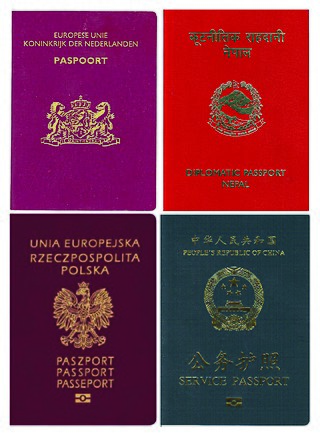Related Research Articles

General aviation (GA) is defined by the International Civil Aviation Organization (ICAO) as all civil aviation aircraft operations except for commercial air transport or aerial work, which is defined as specialized aviation services for other purposes. However, for statistical purposes, ICAO uses a definition of general aviation which includes aerial work.

The International Civil Aviation Organization is a specialized agency of the United Nations that coordinates the principles and techniques of international air navigation, and fosters the planning and development of international air transport to ensure safe and orderly growth. The ICAO headquarters are located in the Quartier international de Montréal of Montreal, Quebec, Canada.

A passport is an official travel document issued by a government that contains a person's identity for international travel. A person with a passport can travel to and from foreign countries more easily and access consular assistance. A passport certifies the personal identity and nationality of its holder. It is typical for passports to contain the full name, photograph, place and date of birth, signature, and the issue and expiration dates of the passport. While passports are typically issued by national governments, certain subnational governments are authorised to issue passports to citizens residing within their borders.
PKD may stand for:

The (International) Radiotelephony Spelling Alphabet, commonly known as the NATO phonetic alphabet, is the most widely used set of clear code words for communicating the letters of the Roman alphabet. Technically a radiotelephonic spelling alphabet, it goes by various names, including NATO spelling alphabet, ICAO phonetic alphabet and ICAO spelling alphabet. The ITU phonetic alphabet and figure code is a rarely used variant that differs in the code words for digits.

An aviation accident is defined by the Convention on International Civil Aviation Annex 13 as an occurrence associated with the operation of an aircraft, which takes place from the time any person boards the aircraft with the intention of flight until all such persons have disembarked, and in which (a) a person is fatally or seriously injured, (b) the aircraft sustains significant damage or structural failure, or (c) the aircraft goes missing or becomes completely inaccessible. Annex 13 defines an aviation incident as an occurrence, other than an accident, associated with the operation of an aircraft that affects or could affect the safety of operation.

The export of cryptography from the United States to other countries has experienced various levels of restrictions over time. World War II illustrated that code-breaking and cryptography can play an integral part in national security and the ability to prosecute war. Changes in technology and the preservation of free speech have been competing factors in the regulation and constraint of cryptographic technologies for export.

A biometric passport is a traditional passport that has an embedded electronic microprocessor chip, which contains biometric information that can be used to authenticate the identity of the passport holder. It uses contactless smart card technology, including a microprocessor chip and antenna embedded in the front or back cover, or centre page, of the passport. The passport's critical information is printed on the data page of the passport, repeated on the machine readable lines and stored in the chip. Public key infrastructure (PKI) is used to authenticate the data stored electronically in the passport chip, supposedly making it expensive and difficult to forge when all security mechanisms are fully and correctly implemented.
Aviation law is the branch of law that concerns flight, air travel, and associated legal and business concerns. Some of its area of concern overlaps that of admiralty law and, in many cases, aviation law is considered a matter of international law due to the nature of air travel. However, the business aspects of airlines and their regulation also fall under aviation law. In the international realm, the International Civil Aviation Organization (ICAO) provides general rules and mediates international concerns to an extent regarding aviation law. The ICAO is a specialized agency of the United Nations.

United States passports are passports issued to citizens and nationals of the United States of America. They are issued exclusively by the U.S. Department of State. Besides passports, limited-use passport cards are issued subject to the same requirements. It is unlawful for US citizens and nationals to enter or exit the country without a valid US passport or passport-replacement document compliant with the Western Hemisphere Travel Initiative, though there are many exceptions; waivers are generally granted for U.S. citizens returning without a passport, and the exit requirement is not enforced. As of December 2023, a United States passport allows visa-free travel to 186 countries and territories, being ranked as the seventh most powerful in the world in terms of travel freedom.
A machine-readable passport (MRP) is a machine-readable travel document (MRTD) with the data on the identity page encoded in optical character recognition format. Many countries began to issue machine-readable travel documents in the 1980s. Most travel passports worldwide are MRPs. The International Civil Aviation Organization (ICAO) requires all ICAO member states to only issue MRPs as of April 1, 2010, and all non-MRP passports must expire by November 24, 2015.

A German passport is an identity document issued to nationals of Germany for the purpose of international travel. A German passport is, besides the German ID card and the German Emergency Travel Document, the only other officially recognised document that German authorities will routinely accept as proof of identity from German citizens. Besides serving as proof of identity and presumption of German nationality, they facilitate the process of securing assistance from German consular officials abroad. German passports are valid for ten years or six years and share the standardised layout and burgundy red design with other EU passports. Every German citizen is also a citizen of the European Union. The passport, along with the national identity card, allows for free rights of movement and residence in any of the states of the European Union, European Economic Area and Switzerland.

Civil aviation is one of two major categories of flying, representing all non-military and non-state aviation, both private and commercial. Most countries in the world are members of the International Civil Aviation Organization and work together to establish common Standards and Recommended Practices for civil aviation through that agency.

Bundesdruckerei produces documents and devices for secure identification and offers corresponding services. It is based in the Berlin district of Kreuzberg. In addition to complete passport and ID card systems, the security printing house also offers ID documents, high-security cards, document checking devices, security software and trust center services. Bundesdruckerei also produces banknotes, stamps, visas, vehicle documents, tobacco revenue stamps and electronic publications. It was founded as Reichsdruckerei in 1879 and existed under this name until 1945. The Ottoman Halid Hamid reported in 1918 that the print was of remarkable quality and they were even able to print Egyptian hieroglyphs in prints for Museums in Egypt. Further they printed in a variety of scripts such as Cyrillic, Georgian, Armenian, Arabic, Kurdish or Syriac among others.

The passport of Kosovo is a travel document that is issued by the Interior Ministry of Kosovo to the citizens of Kosovo to enable them to travel abroad. The passports are also used as proof of identity within the country, along with the national identity card.
Supplemental access control (SAC) is a set of security features defined by ICAO for protecting data contained in electronic travel documents. SAC specifies the Password Authenticated Connection Establishment (PACE) protocol, which itself supplements and improves upon the Basic Access Control (BAC) protocol also established by ICAO. PACE, like BAC, prevents two types of attacks:
The Immigration & Passport Police Office is a subdivision of Law Enforcement Command of Islamic Republic of Iran with the authority to issue Iranian passports and deals with Immigrants to Iran. The agency is a member of ICAO's Public Key Directory (PKD).
References
- ↑ "Frequently Asked Questions". ICAO. Retrieved 11 March 2024.
- ↑ "UN Imports PKD Country Signing Certificate". International Civil Aviation Organization. October 2012.
- 1 2 3 4 "ICAO PKD Participants". International Civil Aviation Organization . Retrieved 2018-11-20.
- ↑ "Bundesdruckerei macht das Reisen weltweit sicherer". Bundesdruckerei GmbH. July 2015. Archived from the original on 2020-06-15. Retrieved 2015-07-03.